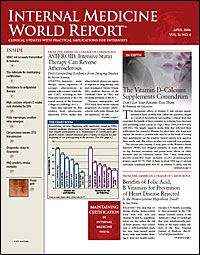Publication
Article
Internal Medicine World Report
Resistance to Antiplatelet Therapy Varies: Investigational Agent Shows Promise
Atlanta—Almost 7% of patients who present to the emergency department with a suspected acute coronary syndrome (ACS) are resistant to high-dose aspirin and are more likely to return to the emergency department and have a repeat hospitalization within 30 days compared with patients who are not resistant to aspirin.
Furthermore, a considerable number of patients with diabetes who are treated with dual antiplatelet therapy have suboptimal responses to both aspirin and clopidog?rel (Plavix).
These data are from presentations at the 55th annual scientific session of the American College of Cardiology.
Many believe that aspirin resistance may be overcome by increasing the dose to 325 mg, but this was not borne out in a study conducted by W. Franklin Peacock IV, MD, director of clinical operations, Department of Emergency Medicine, Cleveland Clinic, Ohio, and colleagues.
In their study, aspirin resistance was determined in a sample of 200 patients presenting to the emergency department with at least 10 minutes of chest pain or an ischemic equivalent within the previous 24 hours. Two hours after receiving 325 mg of aspirin, a blood sample was obtained and assess?ed for platelet function using a bedside assay.
Overall, 13 (6.5%) patients were aspirin-resistant, nearly one fourth (23.1%) of whom were defined as high risk. At 1-month follow-up, 12.5% of aspirin-resistant patients had returned to the emergency department compared with only 4.9% of aspirin responders. Rehospitalization within 30 days occurred in 12.5% of the aspirin-resistant patients, compared with only 4.3% of the aspirin responders.
In another study, investigators at San Carlos University Hospital in Madrid, Spain, recruited 187 patients with diabetes and stable coronary artery disease (CAD) who were taking long-term aspirin (100 mg/d) and clopidogrel (75 mg/d) therapy. Platelet function testing found that 51% were resistant to aspirin. Adenosine diphosphate–induced platelet aggregation testing discovered 25% were resistant to clopidogrel. Some 13% were resistant to both drugs.
The same investigators studied another group of 86 patients with diabetes and known CAD who were taking aspirin and clopidogrel for at least 1 month. Adenosine diphosphate– induced platelet aggregation testing showed that 24 patients were hyporesponders to clopidogrel.
Among the hyporesponders, the “combination of clopidogrel and aspirin is not associated with synergistic antiplatelet effects,” said lead investigator Dominick J. Angiolillo, MD, of the University of Florida, Jacksonville. “Alternative platelet regimens are warranted in these patients to achieve more enhanced platelet inhibition.”
One such alternative antiplatelet agent is in phase 3 clinical trials. Prasugrel (Sankyo, CS-747; Eli Lilly, LY640315) is a novel thienopyridine that blocks the P2Y12 adenosine diphosphate receptor and inhibits platelet activation and aggregation mediated by this receptor.
Response varies to the active metabolite of clopidogrel formed in the liver. In contrast, the metabolic transformation with prasugrel occurs in the blood and the intestinal wall, resulting in more efficient generation.
In a study of 81 aspirin-treated pa?tients with stable CAD, investigators administered loading doses of prasugrel (40 or 60 mg) or clopidogrel (300 mg) and then measured platelet aggregation. More than 90% of prasugrel-treated patients achieved >20% inhibition of platelet aggregation compared with fewer than 50% of those assigned to clopidogrel. Prasugrel-treated patients with more active platelets at baseline had higher and more consistent platelet aggregation inhibition.
W.K.
Andrew Frelinger III, PhD, associate director of the Center for Platelet Function Studies, University of Massa?chusetts, Worcester, said, “We hope that the ability of prasugrel to quickly and effectively inhibit platelet aggregation, by mechanisms distinct from and complementary to aspirin, will translate into improved clinical outcomes in future trials.”—






